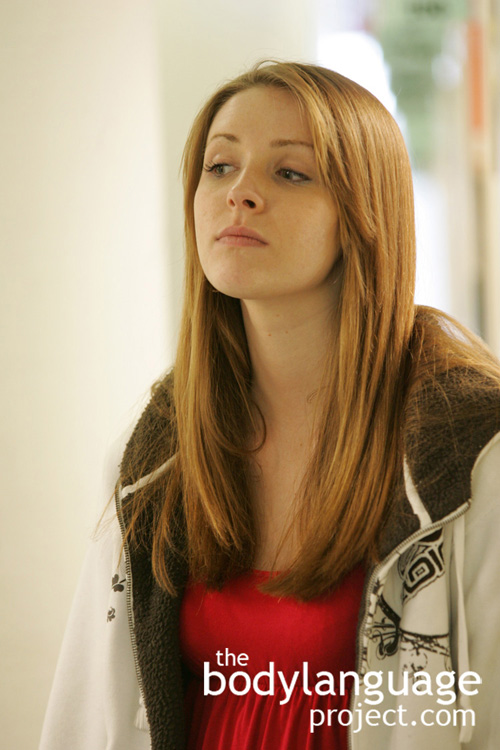
Head Tilt Forward And Back by Patrick9 Morrisey Exercise Howto Skimble
Benign paroxysmal positional vertigo (BPPV) is the most common of the inner ear disorders. BPPV can affect people of all ages but is most common in people over the age of 60. Most patients can be effectively treated with physical therapy. In rare cases, the symptoms can last for years. What causes BPPV?

Teenage Girl Tilting Head Back Portrait Closeup HighRes Stock Photo Getty Images
The head tilt is a simple stretch that helps relieve stiffness and pain in your neck and upper back. What Muscles Do Head Tilts Work? This targeted exercise primarily stretches these two muscle groups: Sternocleidomastoid. These powerful muscles are located on either side of your neck. They run from your collarbones to the base of your skull.

"Relaxed Black Woman Tilting Up Head" by Stocksy Contributor "Danil Nevsky" Stocksy
BPPV is an inner ear problem that causes short periods of vertigo when your head is moved in certain positions. The term 'Vertigo' means a sensation of spinning and movement affecting you or your surroundings. It happens most commonly when lying down, turning over in bed and looking up. The vertigo should settle within a minute.

Body Language of The Head Tilted Back Nonverbal Body Language Dictionary
1. Misalignment of the eyes or strabismus. Sometimes, a person's eyes are misaligned. One eye looks at something while the other eye looks elsewhere. This is called a squint, strabismus, or crossed.

Woman Head Tilted Back Stock Photo 2109753 Shutterstock
Symptoms Diagnosis Treatment Outlook Q&A Wry neck, or torticollis, is a neck painfully twisted and tilted to one side. The top of the head generally tilts to one side while the chin tilts to.

Head tilted back hires stock photography and images Alamy
If benign paroxysmal positional vertigo (BPPV) is hard to cope with or doesn't go away on its own, a simple treatment can be done. The treatment consists of doing certain head and body movements in a specific order. The aim is to make the problems in the organ of balance go away. In about half of all people who have BPPV, the symptoms go away after only 1 to 3 months. So treatment isn't.

Head tilted back hires stock photography and images Alamy
Overview Benign paroxysmal positional vertigo (BPPV) is one of the most common causes of vertigo — the sudden sensation that you're spinning or that the inside of your head is spinning. BPPV causes brief episodes of mild to intense dizziness. It is usually triggered by specific changes in your head's position.

Woman Tilting Head Back Side View Close Up Stock Photo Getty Images
Benign paroxysmal positional vertigo (BPPV) is an inner- ear disorder that is the most common cause of vertigo, a very specific kind of dizziness that makes you feel as if the room is spinning.

Girl Laughing With Head Tilted Back Stock Photo Download Image Now iStock
Vertigo that is experienced after a change in head position such as lying down flat, turning over in bed, tilting back to look up, or tilting down to stoop No associated hearing loss or fullness feeling in the ear Some nausea, but usually not severe and usually not associated with vomiting

Woman Tilted Her Head Back Side Foto stock 1168030558 Shutterstock
Benign paroxysmal positional vertigo (BPPV) is among the most common causes of vertigo — the sudden feeling that you're spinning or that the within your head is spinning or having dizziness when tilting your head (especially when tilting head back .)

womantiltingbackheadeyesclosedcloseuppictureid57260598 (792×1024) Drawing people
Vertigo causes a patient to feel like there is movement where there is none. It may cause feelings of tilting, spinning or falling, nausea, vomiting and even trouble walking or standing. Common causes of vertigo include Benign Paroxysmal Positional Vertigo (BPPV) which is intense, brief episodes of vertigo immediately following a change in the.

Young black woman portrait head tilted back — Stock Photo © jeffwqc 3514518
If you are dizzy right now and have any of the following neurological symptoms along with your dizziness or vertigo, call 911 immediately: New confusion or trouble speaking or understanding speech. New slurred speech or hoarseness of voice. New numbness or weakness of the face, arm, or leg. New clumsiness or tremor (shaking) of the arms or legs.

Love the arm pose and the head tilted back Hand On Head, Nape, Pose Reference, Arms, Photoshoot
Benign paroxysmal positional vertigo (BPPV) is a common inner ear disorder. With BPPV, changes in your head position — such as tipping your head backward or sitting up in bed — lead to sudden vertigo (a feeling that the room is spinning).

Young Woman In Ocean Tilting Head Back Side View Closeup HighRes Stock Photo Getty Images
head down. chin. of 7. NEXT. Browse Getty Images' premium collection of high-quality, authentic Head Tilted Back stock photos, royalty-free images, and pictures. Head Tilted Back stock photos are available in a variety of sizes and formats to fit your needs.

Woman laying on back with head tilted back smiling stock photo (139110) YouWorkForThem
Health Issues Head Tilt (Torticollis) Head tilt is a condition that causes a child to hold her head or neck in a twisted or otherwise abnormal position. She may lean her head toward one shoulder and, when lying on her stomach, always turn the same side of her face toward the mattress.

Young Black Woman With Head Tilted Back Royalty Free Stock Photo Image 8795095
Head Tilted Back royalty-free images 2,259 head tilted back stock photos, 3D objects, vectors, and illustrations are available royalty-free. See head tilted back stock video clips Filters All images Photos Vectors Illustrations 3D Objects Sort by Popular Woman doing Neck Rolls to stretch neck muscle before a workout. Illustration about warmup.